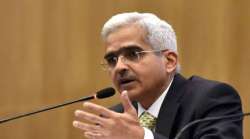RBI board agrees to further examine governance framework, governor promises to discuss key issues with govt
The board discussed a wide range of topics including the current economic situation, global and domestic challenges, matters relating to liquidity and credit delivery as well as issues related to currency management and financial literacy.

The RBI board, in its first meeting under new governor Shaktikanta Das, on Friday agreed to discuss the governance framework of the central bank further.
The board discussed a wide range of topics including the current economic situation, global and domestic challenges, matters relating to liquidity and credit delivery as well as issues related to currency management and financial literacy.
The board meeting, which lasted for nearly four hours, also discussed the draft report on the trends and progress of banking (2017-18).
“The board deliberated on the governance framework of the RBI and it was decided that the matter needs further examination,” RBI said in a terse statement after the meeting.
This was the first board meeting chaired by Das, who took over as the 25th governor Wednesday after the surprise resignation of Urjit Patel Monday.
Governor Shaktikanta Das Friday assured the Reserve Bank’s central board to discuss the deliberations on capital management and governance with government for an early resolution, PTI reported quoting its sources.
Das, who was chairing the keenly-watched board meeting following his appointment earlier this week, listened to all the points of discussions, including those which had caused discomfort within the RBI brass, they said.
In the previous meeting held on November 19, which lasted over 10 hours, the board had decided to constitute a committee of experts to fix an appropriate level of economic capital framework (ECF) for the central bank which would decide how much contingency reserves it should hold any given time and the membership and terms of reference of which will be jointly determined by government and RBI.
Nothing has officially progressed on the matter as government and RBI are not yet on same page on the name of the chairman of the six-member panel.
The issue of transfer of RBI’s excess reserves, which stood at Rs 9.43 trillion as of June 2018, to government has been one of the contentious issues between the government and the central bank for a long time and also one of the key reasons for the sudden exit of Patel.
At the last meet, the RBI board had also decided to refer the issue of relaxing the PCA framework—under which are 11 of the 21 state-run banks—to the board of financial supervision of the central bank.
It can be noted that some of the new government nominees to the RBI board have been demanding that the central bank should be run by the board and not just by the management.
Apart from some key North Block mandarins, the votaries of this view include the Sangh ideologue S Gurumurthy who was appointed to the board only in August and ex-chief economic advisor Arvind Subramanian. They say RBI should also be run by the board.
Thursday evening, coal minister Piyush Goyal also turned his guns at RBI over this issue and alleged that the RBI management—the governor and the four deputies— arbitrarily decided on the PCA framework, keeping the board in the dark.
If the board votes for a board-driven RBI, then that will be the biggest blow to the operational independence of the central bank, say many central bank watchers.
(With PTI inputs)
